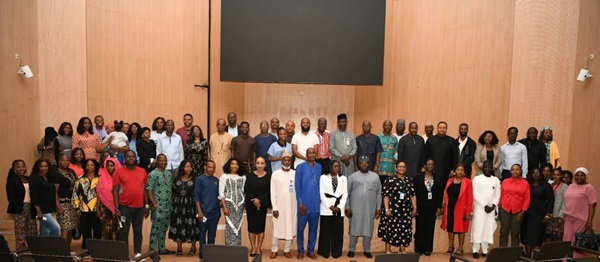
The Nigerian Communications Commission (NCC) has assured Nigerians that telecom service rates are determined through a thorough and transparent cost study that analyses the actual expenses involved in providing the services.
The executive vice chairman (EVC) of the NCC, Dr. Aminu Maida gave this assurance during an interactive session with members of the Nigeria Information Technology Reporters’ Association (NITRA) in Abuja.
Maida emphasised that the NCC plays a crucial regulatory role in the telecom sector to ensure that tariffs imposed by service providers are fair and reflect real costs.
“Rates are not simply plucked out of thin air. The commission undertakes a detailed cost study to examine what it truly costs to deliver a particular service,” he explained.
Speaking specifically about USSD charges, Maida addressed public concerns over the N6.98 deduction from airtime during transactions.
“You ask about the N6.98 Unstructured Supplementary Service Data (USSD) deduction – where does this figure come from? Did we just decide on it randomly? The answer is no,” he said.
He explained that before any rate is approved, the NCC conducts a detailed cost study to establish the actual cost of providing that service.
“We have done this for USSD charges and are currently updating the study to reflect current realities. Once the new study is completed, we will issue a determination that considers all relevant cost elements. This ensures that the charges are rooted, not guesswork,” he said.
Maida added that such cost studies consider factors like infrastructure investment, ongoing maintenance, personnel and other operational costs.
Highlighting the liberalised nature of Nigeria’s telecom industry, the EVC stressed that while consumers may not directly participate in tariff-setting discussions, the commission acts as their watchdog.
“Consumers don’t sit at the table to negotiate these rates, but we protect their interests by carefully reviewing the service providers’ cost justifications. If a provider proposes a rate for calls or data, they must break down the costs to prove it is justified. This ensures that consumers are not exploited with arbitrary fees,” he noted.
Maida also reaffirmed the Commission’s commitment to transparency and fairness in tariff determination, assuring Nigerians that no rate is allowed without due diligence.
On another note, Maida decried the growing menace of vandalism targeting Critical National Infrastructure (CNI), describing it as a major threat to Nigeria’s digital economy and security.
He vowed that the NCC would intensify its stance against such acts, warning perpetrators of severe legal consequences.
“Telecom services are critical to our national security and economic growth. For instance, between May 21 and May 31 alone, we recorded over 147 fibre cuts in just ten days. This caused massive service disruptions in affected locations,” he said.
Maida disclosed that the NCC is working to implement the Digital Infrastructure Initiative (DII) and is collaborating with stakeholders to ensure that telecom assets are officially designated as Critical National Infrastructure.
He stressed that protecting these assets is vital for the stability of sectors like finance, healthcare, education, security and public services, all of which depend heavily on reliable telecommunications infrastructure.

